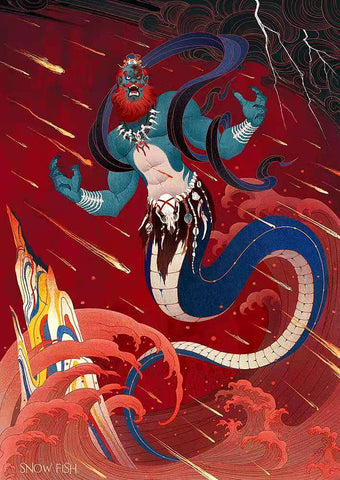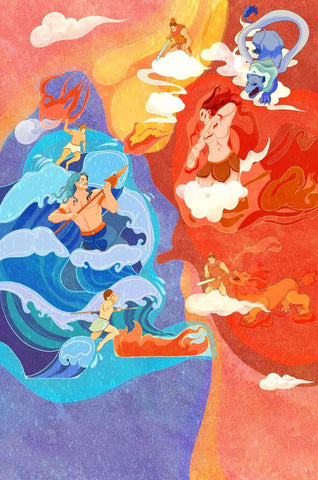In ancient times, Yellow Emperor and Yan Emperor fought for the throne, and finally Yan Emperor was defeated. In order to take revenge for his ancestors, Water god Gong Gong, the descendant of Yan Emperor, declared war on Zhuan Xu, the descendant of Yellow Emperor.

Gong Gong was born with human’s face but snake’s body, quite different from ordinary people. Strong and mighty as he was, he was more audacious than wise. Zhuan Xu was not as powerful as Gong Gong was, but he was resourceful and good at wining trust and support of the people. The war was extremely fierce, with tow troops fighting from heaven to ground and ground to heaven. Although neither could get the upper hand in the beginning, Gong Gong suffered one defear after another when Zhuan Xu adopted flexible tactics. After several major wars, Goog’s troop, with fewer and fewer soldiers, was besieged at the foot of Buzhou Mountain. Looking back at the approaching pursuing forces and the remaining teams, Gong Gong flied into a shameful rage, and suddenly struck the mountain with his head.

With an earth-shaking blare, Buzhou Mountain was cut down in the middle and collapsed. But who could ever expect this mountain was actually a pillar propping up the sky? When one pillar was snapped, the whole universe would undergone tremendous changes. The sun, the moon and the stars followed the northwest direction as the sky there tilted down. That’s the reason why we today see these celestial bodies rise in the east and set in the west. Meanwhile the rope tied to the southeast corner of the earth broke, leaving the ground level uneven with the northwest higher and the southeast lower, which gave rise to the phenomenon that all the rivers flow to the east.
As a famous Chinese myth in remote ages, Gong Gong hitting Buzhou Mountain, together with Nüwa patching the sky, Hou Yi shooting the suns, the Goddess Chang’s fly to the moon, is known as the four great myths of ancient China.
Leave a comment